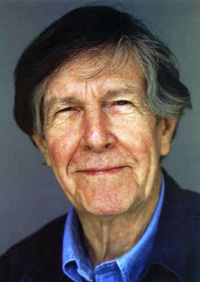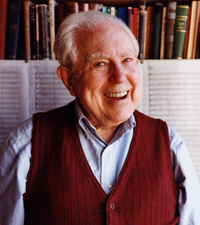Special Reports
2012 News Milestone No. 7
 Cage Turns 100, Carter Dies:
Cage Turns 100, Carter Dies:
The Shifting Definition of “Art” Music
 The rigorous argument of Elliott Carter’s works and natural inclusiveness of John Cage’s explorations changed the way we think about and listen to music. Cage, who died in 1992 and whose music enjoyed a yearlong global centennial celebration in 2012, “wanted to discard inherited structures, open doors to the exterior world, ‘let sounds be just sounds,” wrote Alex Ross in The New Yorker.
The rigorous argument of Elliott Carter’s works and natural inclusiveness of John Cage’s explorations changed the way we think about and listen to music. Cage, who died in 1992 and whose music enjoyed a yearlong global centennial celebration in 2012, “wanted to discard inherited structures, open doors to the exterior world, ‘let sounds be just sounds,” wrote Alex Ross in The New Yorker.  Carter on the other hand, wrote Ivan Hewett in the Guardian upon the composer’s death in November at age 103, had no interest in “sounds of the moment…He wanted a modernism beyond fashion, rooted in a new kind of syntax, and to achieve that some European sophistication would be necessary.”
Carter on the other hand, wrote Ivan Hewett in the Guardian upon the composer’s death in November at age 103, had no interest in “sounds of the moment…He wanted a modernism beyond fashion, rooted in a new kind of syntax, and to achieve that some European sophistication would be necessary.”
Impact: Cage’s influence was extremely far-reaching, well beyond music into the art, modern dance, and pop realms, and in turn he was influenced by Zen Buddhism, “I Ching,” astronomical charts, the musical possibilities inherent in indeterminacy and in silence itself. Cage would have been amused by a piece that Allan Kozinn wrote in August upon realizing that he had immersed himself in a subway remix of 4’ 33.”
Meanwhile Carter remained mentally sharp into his 103rd year. When Alisa Weilerstein visited him in July to play and discuss his cello concerto, which she recently recorded, the composer followed along with the score and a magnifying glass, interrupting her in merry exchanges. (see video).
Current status: Carter still has a world premiere in the offing—a 12-minute orchestral work, Instances, in February 2013 with Ludovic Morlot and the Seattle Symphony.





 FEATURED JOBS
FEATURED JOBS

 RENT A PHOTO
RENT A PHOTO


